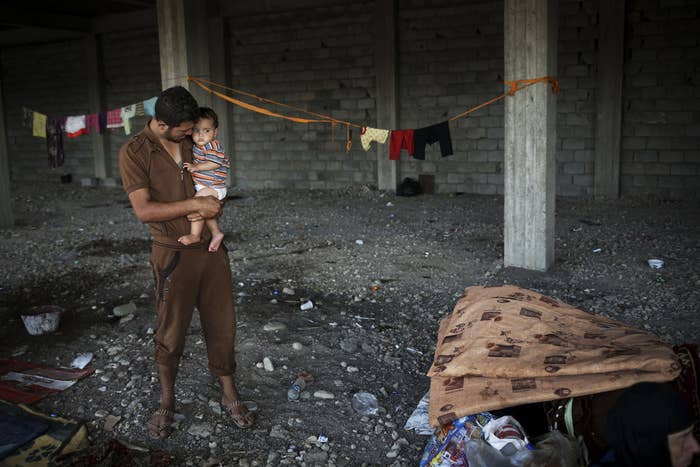
KALAK, Iraq – Members of the Abd family sit halfway between the northern Iraqi cities of Mosul and Irbil, stranded, they say, by a war that has left them stateless.
In a dusty abandoned storefront in the Kurdish town of Kalak, they huddle with dozens of other Sunni families who fled last month after the militant group ISIS seized control of Mosul, Iraq's second largest city.
"Most of the Sunnis stayed in the beginning, because we thought it would be safe for us," said Saadek Abd, 29, who used to run a small grocery store in Mosul. "Then we realized that ISIS was not for Sunnis, they were only for Sunnis like them."
While ISIS is often identified as a Sunni group, its leaders practice an extreme and punishing form of Sunni Islam, demanding complete adherence to their strict interpretation of sharia law. The group has driven Shiites, Christians, and other minority groups like the Yazidi from the vast areas of Syria and Iraq they have conquered, demanding that they convert, flee, or be killed. While many Sunnis have welcomed ISIS as liberators from Iraq's Shiite-majority government, others have felt estranged by the group's hard-line views on Islam.
Among those Sunnis who have fled ISIS-controlled Mosul, there is a feeling of limbo, as they set up camp midway between Mosul and Irbil, the Kurdish capital. City officials have not allowed them to enter Irbil, they said.
"Do I want to live here in the dirt and the heat? No, of course not," said Younis Aly, 26, who fled Mosul nearly six weeks ago. His children took turns using a small towel to fan the youngest member of their family, 7-month-old Yusef, who they said was suffering from heat exhaustion in the nearly 100-degree heat. "Do I understand why they do not want me in Irbil? Yes. There are many Sunnis who would spy or work for ISIS. I am not one of them, but I find myself being suspicious of everyone these days."

Aly said he fled Mosul after ISIS hunted and kidnapped members of his family. His older brother and a cousin worked for the Iraqi army, he said, making them targets of ISIS.
"They kidnapped several cousins. I hid, and then I ran away because I was afraid they would kidnap me next," he said. "I am Sunni, but they would have killed me too."
When he tried to enter Irbil, however, he was turned back from the main checkpoint outside the city. He made his way to Kalak, and began to share a small cluster of abandoned buildings with several other Sunni families who found themselves similarly stranded.
Officials in Irbil said there were growing fears that ISIS had already sent some of their fighters to spy on the city and try to collect information in preparation of a future attack. They said that while the Kurdish government was trying to do its best to help hundreds of thousands of refugees who had streamed toward the city in recent weeks, they could not house them all within the city.
On Monday, the Kurdish Peshmerga fighting forces said they had succeeded in driving ISIS back from several towns around Irbil, and that their forces were engaged with ISIS fighters around the Mosul dam. The Peshmerga have said they want to push ISIS back from northern Iraq, a semiautonomous region they have long defended.
The resignation of Iraqi Prime Minister Nouri al-Maliki last week has paved the way for the Kurds to join many other Sunnis, Shiites, and non-Muslim groups across Iraq in supporting the new government's fight against the spread of ISIS. Maliki had long been criticized of fueling the rise of ISIS by supporting sectarian policies which promoted Iraq's Shiite majority while disenfranchising millions of Sunni Muslims.
Abu Diya, a Sunni Muslim who fled Mosul with his wife and seven children last month, said it would not be easy to stop the steady progression of ISIS across Syria and Iraq. The 50-year-old said that many of his Sunni neighbors supported the group, whom they saw as their defenders against the Shiite majority of the state.
"I did not feel the same way and I argued with them. I said, these people, these ISIS, are not like us," he said, adding that he began to receive threats and warnings from people after his wife refused to wear the full face veil, or niqab. "People were not happy with her behavior and told me that women should not behave in this way."
He said that after hearing reports that ISIS had stoned two women in Syria last month, he decided it was time to pack up and move his family.
"I knew these were not people who cared if you were Christian, Sunni, or Shiite, they only cared if you were ISIS or not ISIS," said Aly.

